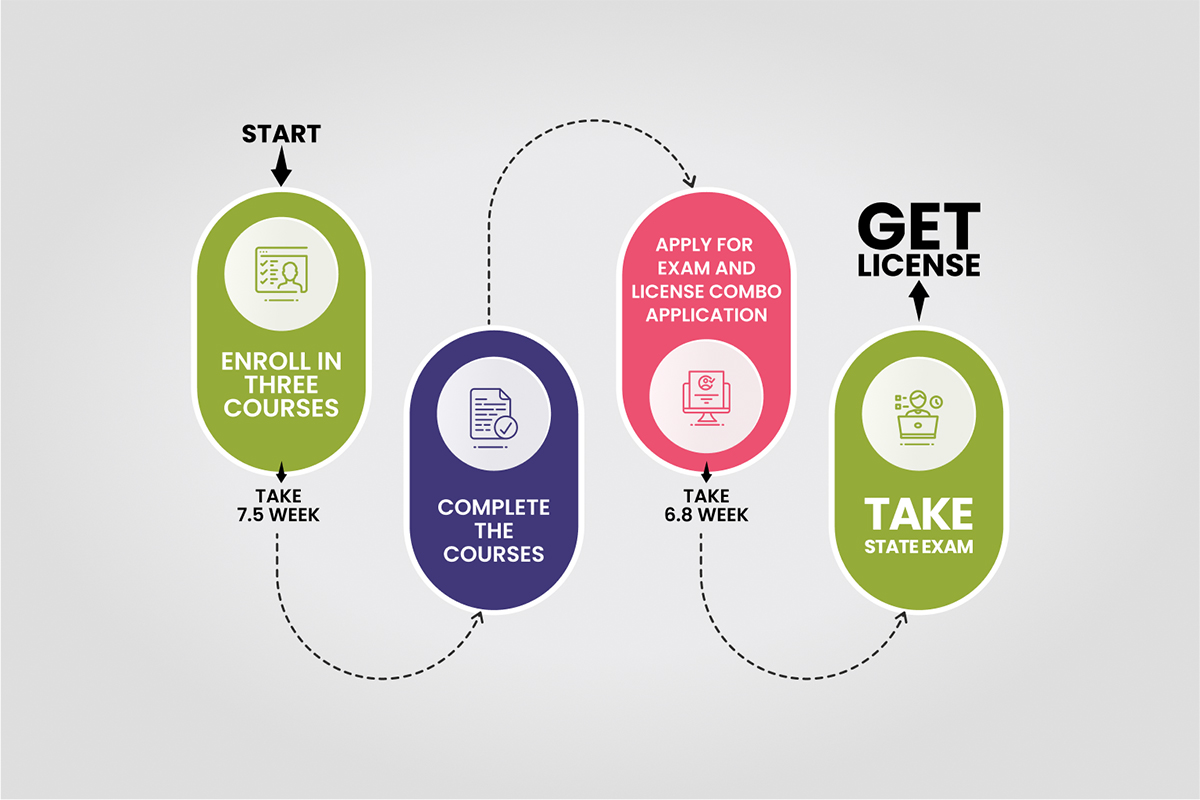
Real Estate License Expiration in California: What Are Your Options?
The California real estate market is bustling with opportunities. Yet, life's unpredictable nature sometimes calls for a pause, Read more...
Real Estate License Expiration in California: What Are Your Options?
The California real estate market is bustling with opportunities. Yet, life's unpredictable nature sometimes calls for a pause, leading many agents to an inactive license status. Did you know that thousands of California real estate licenses move into an expired status each year due to various personal and professional reasons? If you're one of many facing this scenario, exploring your options and making informed decisions to manage your career trajectory effectively is crucial.
Understanding License Inactivity
In California, a real estate license is deemed expired if not renewed prior to expiration. Reasons for this may range from a career shift or relocation to personal commitments or simply taking a break from the industry. Holding an expired license means you're prohibited from engaging in any activities requiring an active license.
Understanding Late Renewal of The License
If you don't renew your license before it expires, you are granted a two-year grace period for late renewal. During this period, you must refrain from any activities that require a valid real estate license until your renewal is processed and approved.
Options for Expired Licensees
1. Reactivation:
Reactivating your license is a straightforward process outlined by the California Department of Real Estate (DRE). It involves completing required continuing education hours and paying the applicable fees. If you renew late, you must pay the license renewal fee plus a late fee. The specific courses needed vary depending on whether it is your first real estate license renewal or subsequent renewal.
2. Letting the License Expire:
If you're sure you won't return to real estate, you might choose to just let your license expire out.
There are several drawbacks to this approach:
Future uncertainty: Even if you are currently confident in your decision, your circumstances or interests may change in the future. Keeping your license active provides you with the flexibility to return to real estate if an opportunity arises.
Reapplication challenges: If you decide to re-enter the field later, you'll have to start from scratch, repeating the entire licensing process, which can be time-consuming and costly.
Professional network: Maintaining an active license can help you stay connected to the real estate industry and its network, which could be beneficial even in other career paths.
While letting your license expire might seem appealing in the short term, it could limit your options and create unnecessary hurdles if you ever decide to return to real estate.
Risks In Letting the License Expire
Consider a scenario where you obtained a real estate broker's license in 2004. At that time, a four-year college degree could count towards the two years of real estate experience required to qualify for a broker license. However, regulations changed significantly by January 1, 2013. From then on, only a degree specifically in real estate or two years of actual real estate experience would meet the qualifications for a broker's license.
Now, imagine that you allowed that broker license to expire in 2008. If you were to seek requalification after 2013 under the new rules, your previous degree (unless in real estate) would no longer suffice. Additionally, by 2024, new requirements were introduced, including completing a Real Estate Practice course that incorporates training on implicit bias—recognizing and addressing unconscious prejudices in professional settings.
The lesson here is clear: maintaining your licensure continuously can shield you from the impact of such regulatory changes. Keeping your license active means you retain qualification under the conditions that existed when you were first licensed—often referred to as being 'grandfathered in.' Letting your license lapse, however, could mean facing more stringent, updated requirements should you decide to re-enter the field.
Benefits of Reactivating Your License
Reactivating your license can reopen numerous economic and professional doors. By diving back into the thriving California real estate market, you can capitalize on emerging trends and leverage your existing network and expertise. Consider the significant effort required to retake and pass the real estate license exam again, especially after you've already completed the required courses through a real estate license school. Reactivating your license avoids this hassle. Many agents have found renewed success and satisfaction in their careers after reactivating their licenses, demonstrating the clear advantages of maintaining active status.
How to Plan for Reactivation
Effective planning ensures a smooth return to active status. Start by familiarizing yourself with the continuing education requirements and by setting aside funds for associated fees. Engage with your network, stay abreast of industry trends, and consult a mentor or career coach to strategize your reentry.
Whether you reactivate, maintain, or let your license expire, understanding your options is fundamental for effective career management in real estate. Proactively addressing your license status positions you for future success in California's dynamic real estate environment.
Ready to reactivate your real estate license or need more guidance on your options? Contact us today for a free consultation to tailor a plan that best suits your professional needs. Let us help you navigate your journey back to active status quickly and confidently!
|

Are Classes Required for a California Real Estate License?
There's a myth that anyone can take the California real estate licensing exam and obtain a real estate license without taking any formal Read more...
Are Classes Required for a California Real Estate License?
There's a myth that anyone can take the California real estate licensing exam and obtain a real estate license without taking any formal education. While there's a grain of truth to this for members of the California bar, most aspiring real estate agents need to complete mandatory pre-licensing coursework before they can even sit for the exam. Let's clear up the confusion with accurate information and guidance.
Overview of California Real Estate Licensing Requirements
To become a licensed real estate agent in California, you must meet several key requirements set by the California Department of Real Estate (DRE). These include:
Age: Be at least 18 years old.
Honesty: Have an acceptable criminal record, as criminal convictions may lead to license denial.
Education: Complete 135 hours of approved pre-licensing education consisting of 45 hours of Real Estate Principles, 45 hours of Real Estate Practice and 45 hours of one elective course.
Mandatory Pre-Licensing Education
Pre-licensing education is crucial for several reasons:
Foundational Knowledge: It covers essential principles of real estate law, practice, finance, and ethics.
Exam Preparation: The courses directly prepare you for the content and format of the state exam.
Career Success: A solid educational foundation sets you up for a smoother transition into the real estate profession.
Student Testimonial:
Joe Buck:
"The courses at Adhi Real Estate School not only prepared me for the exam but also gave me the confidence to start my career. The Real Estate Practice course was particularly impactful,"
The Lawyer Exemption
Due to their extensive legal training, lawyers licensed to practice in California are exempt from the pre-licensing education requirement. However, they still must pass the state licensing exam. You can read more about this exemption here.
How to Enroll in Pre-Licensing Classes
If you're not a lawyer, your next step is enrolling in pre-licensing classes. Choose an accredited real estate school like ADHI Schools. We offer comprehensive courses to prepare you for the exam and career.
To succeed in your coursework:
Attend Classes Regularly: Active participation enhances learning.
Ask Questions: Don't hesitate to seek clarification.
Study Diligently: Review materials outside of class.
Utilize School Resources: We offer additional study guides and practice exams.
Understanding the pre-licensing requirements is essential for anyone pursuing a real estate career in California. While lawyers have a unique exemption, most aspiring agents must complete mandatory coursework. This investment in education is a stepping stone to a rewarding career.
Ready to start your real estate journey? Contact Adhi Real Estate School today to learn more about our pre-licensing courses and expert guidance. We're committed to your success and look forward to helping you achieve your career goals!
|

Demystifying the California Real Estate Exam: Is It Open Book?
The California real estate exam is a pivotal step for aspiring real estate professionals aiming to launch their careers. A common question Read more...
Demystifying the California Real Estate Exam: Is It Open Book?
The California real estate exam is a pivotal step for aspiring real estate professionals aiming to launch their careers. A common question that often surfaces is whether this exam is open book. Since we get this question so often at our school, I wanted to write an article to explore the exam format, clearly define its closed book nature, and contrast this with the open book format of the qualifying courses, and provide valuable insights for effective exam preparation.
Understanding the California Real Estate Exam: A Closed Book Format
I hate to be the one to have to tell you this if you’re wondering, but the California real estate exam is closed book. Virtually nothing can be taken into the exam site with you when you go to take the real estate test.
There are lockers at the state testing site in case you need to store your cell phone or other items you may have brought into the facility.
Both exams are multiple choice. The sales license exam is 150 questions and candidates are given up to three hours to take it. The broker exam is 200 questions and must be completed in four hours. Passing scores are 70% and 75% respectively.
Unlike the qualifying courses, this crucial exam is not open book.
Why the California Real Estate Exam Is Not Open Book
The closed book format of the exam is designed to assess a candidate's ability to internalize and recall critical real estate principles, terminology, and laws without external aids. This ensures that future real estate agents are well-equipped to handle transactions confidently and competently.
The Open Book Nature of Qualifying Courses
In contrast to the final exam, the three qualifying courses (Real Estate Principles, Real Estate Practice and one Elective course) required for the California real estate license are generally open book. This format allows candidates to use textbooks and notes, fostering a deeper understanding of the material through active learning and reference. This approach helps ensure that candidates are thoroughly prepared when it comes time to take the closed book exam.
Challenges of a Closed Book Exam and How to Overcome Them
Recalling extensive information under exam conditions can be nerve-racking. However, effective preparation strategies can mitigate these challenges:
Thorough Study: Leverage comprehensive study materials including textbooks and online resources.
Going through the correct pre-license program: Going through the correct pre-license program is crucial. Choosing the right real estate license course prepares you thoroughly for the licensing exam and equips you with the practical knowledge and skills essential for a successful career in real estate.
Practice Tests: Engage with practice exams to become comfortable with the exam format and identify areas for improvement.
Focus on Key Areas: Emphasize real estate laws, contracts, financing, and ethical practices in your studies.
Preparing for Success in the California Real Estate Exam
Effective exam preparation combines active learning with practical application:
Create a Study Schedule: Allocate regular periods for study and revision.
Enroll in a Prep Course: Consider courses from reputable real estate schools like ADHI Schools, designed to enhance understanding and retention of essential real estate concepts.
Utilize Practice Exams: These simulate the testing environment and help assess readiness.
Frequently Asked Questions (FAQ)
How long should I prepare for the exam? Preparation times vary, but at least 3 weeks of dedicated study is typically recommended.
What topics are covered in the California real estate exam? Topics include real estate principles, law, practice, financing, appraisal, and ethics. Learn more about the distribution of questions on the exam here.
Are practice exams available? Numerous practice exams are available through various educational resources and online platforms.
The California real estate exam is a closed book assessment designed to evaluate foundational knowledge in real estate. Through effective study techniques and resource utilization, aspiring agents can significantly enhance their chances of success.
Ready to Start Your Real Estate Career?
Contact ADHI Schools today to learn more about our comprehensive real estate exam preparation courses and resources. Let us guide you through your real estate educational journey and help you unlock the doors to your successful career!
|

Can a Foreigner Become a Real Estate Agent in California?
California's thriving real estate market attracts investors, professionals, and those from around the globe. The allure of diverse cities like Read more...
Can a Foreigner Become a Real Estate Agent in California?
California's thriving real estate market attracts investors, professionals, and those from around the globe. The allure of diverse cities like Los Angeles, San Francisco, and San Diego makes the state a hotspot for real estate activity, prompting many to consider a career in our dynamic field.
For foreigners, the path to becoming a real estate agent in California holds unique prospects and challenges. This article explores the feasibility of non-U.S. citizens' earning a real estate license in the Golden State. Specifically, I wanted to delve into what it takes to meet the requirements set forth by the Department of Real Estate in California.
Whether you're looking to start a new career or expand your existing real estate portfolio internationally, understanding the licensing process is the first step toward success in California's lucrative market.
Understanding Real Estate Licensing in California
To work as a real estate agent in California, you must obtain a salesperson license through the California Department of Real Estate (DRE) after taking real estate courses through an approved real estate school like ADHI Schools. Here's an overview of the requirements and the general steps you'll need to take:
Basic Requirements
Age: Be at least 18 years of age.
Background: Clear a background check While past convictions may not automatically disqualify you, they must be disclosed to the DRE for review.
Education: Complete 135 hours of approved pre-licensing education. This includes three core courses:
Real Estate Principles
Real Estate Practice
An elective course
Language Considerations: While some online courses might be offered in languages other than English, confirm this with the school before enrolling. However, note that the California real estate exam is only administered in English.
Steps to Obtain Your License
Complete Pre-Licensing Courses: Enroll in the required coursework at an approved real estate school like ADHI Schools.
Pass the California Real Estate Exam: Successfully pass the state licensing exam administered by the DRE.
Apply for the License: Submit a formal application to the DRE, including fingerprinting and background check information.
Secure a Sponsoring Broker: In California, you must work under the supervision of a licensed broker in order to practice real estate legally.
Eligibility Criteria for Foreigners
Residency Requirements
Contrary to what many might assume, California does not require real estate agents to be U.S. citizens or permanent residents. However, all applicants must be legally authorized to work in the United States and clear criminal background.
Social Security Number or ITIN Requirements
To apply for a real estate license in California, every candidate must provide a Social Security Number (SSN) or an Individual Taxpayer Identification Number (ITIN). For those who do not have an SSN, obtaining an ITIN is a crucial step. The ITIN serves as a tax processing number issued by the Internal Revenue Service (IRS) to individuals who are required to have a U.S. taxpayer identification number but who do not have, and are not eligible to obtain, an SSN.
Specific Conditions or Exceptions for Non-US Citizens
Foreign nationals must be particularly diligent in complying with all regulatory requirements. This includes the employment mentioned above, tax identification prerequisites, and completing the exact educational and examination requirements as U.S. citizens. It's important to note that certain visas may restrict the ability to conduct business, so consulting with an immigration lawyer can provide personalized guidance.
Challenges and Considerations for Foreigners
While the California real estate market presents exciting opportunities, foreigners seeking to become licensed agents may face some specific challenges:
Language Barriers: Fluency in English is essential for understanding contracts, communicating with clients, and navigating legal terminology. A solid conversational level might need to improve when dealing with complex real estate documents.
Legal Hurdles: Visa requirements, work permits, and tax implications for non-U.S. residents can add complexity. Consulting with an immigration attorney or a tax professional specializing in international clients is advisable.
Cultural Differences: Understanding local real estate practices, negotiating styles, and client expectations within the California market can take time and experience.
Tips for Overcoming Challenges
Improve English Proficiency: If English isn't your first language, invest in language courses or tutors focusing on business and real estate terminology.
Seek Legal Guidance: Consult professionals to ensure you understand all the legal requirements and restrictions regarding your specific visa or residency status.
Build a Network: Connect with other foreign-born real estate agents or join professional associations catering to diverse communities. Their experience and mentorship can be invaluable.
Leverage Your Background: Your language skills and cultural understanding may be significant in serving specific clientele, especially in California's diverse real estate landscape.
Patience and Persistence: Adapting to a new market and overcoming challenges takes time. Stay focused on your goals and be willing to learn and adapt.
Resources and Support
Navigating the path to becoming a real estate agent in California can feel less daunting when you have the right resources and a supportive network. Here are some places foreigners can look for help:
California Department of Real Estate (DRE): The DRE website is your primary source for official information, licensing requirements, and approved education providers.
Real Estate Schools: Many real estate schools cater to diverse populations and may offer language support or additional resources for international students.
Multicultural Real Estate Associations: Organizations like the National Association of Hispanic Real Estate Professionals (NAHREP) or the Asian Real Estate Association of America (AREAA) have local chapters that can provide mentorship and networking opportunities.
Online Forums and Communities: Join online groups or forums dedicated to real estate professionals in California. Seek out those who welcome and support international members.
Remember, you are not alone! Others have successfully achieved their real estate goals in California despite coming from abroad. Proactively seeking out these resources will make your journey smoother.
Entering the California real estate market presents a significant opportunity for growth and success, particularly given the state's dynamic and diverse property landscape. However, foreigners wishing to participate in this vibrant market must navigate challenges and requirements unique to their status.
Despite these hurdles, California's real estate market opportunities are substantial. The state's economy is one of the largest and most diverse in the world, encompassing booming tech sectors, luxurious residential communities, and expansive agricultural lands. This diversity offers a wide range of niches and specializations for real estate professionals.
To those considering this journey, it is essential to approach it with determination and motivation. The process may seem daunting, but the rewards can be equally significant. By meeting the standards the California Department of Real Estate set forth, you demonstrate your commitment and professionalism, which are highly valued qualities in our competitive market.
Love,
Kartik
|

California's bustling real estate market shines for anyone aiming to make their mark in the real estate world. Starting a career in California real estate can unlock endless possibilities and the chance Read more...
California's bustling real estate market shines for anyone aiming to make their mark in the real estate world. Starting a career in California real estate can unlock endless possibilities and the chance for significant financial rewards. It's easy to see why people are drawn to the real estate business. Not only does our industry offer the flexibility to craft a personal brand and business, but it also provides the chance to significantly impact individuals' and families' lives by helping them find their dream homes. For those ready to dive into this thriving market, enrolling in a California real estate license school is the first step toward achieving your goals.
This article focuses specifically on the costs of obtaining a real estate license in California With a comprehensive breakdown of all associated costs, from educational fees to licensing and examination expenses, I want to offer a clear and detailed understanding of what to expect on your journey. Whether considering a career change or looking to enter the workforce with a bang, understanding the costs associated with an accredited California real estate license school is crucial Let's delve into the financial investment required to successfully start a career in California real estate.
Pre-Licensing Education Costs: Finding the Right Fit for Your Budget and Learning Style ADHI Schools' cost: $150-$499
California offers some flexibility when fulfilling your mandatory 135 hours of pre-licensing education. Consider these options to find a program that aligns with your needs and resources:
Online California Real Estate License Schools: Online programs often provide the most affordable and convenient way to complete your coursework. Look for "affordable California real estate license school" options, with ADHI Schools' prices starting at $150. Be sure to consider whether the school offers other resources that could save you money in the long run.
Instructor-led California Real Estate License Schools: ADHI Schools offers instructor-led options that may better suit some learners. While our program is slightly more expensive (ranging from $399 to $499), it provides the benefit of direct interaction with instructors and peers.
Factors Influencing Cost:
School Reputation: Well-established schools with a proven track record, like ADHI, may charge slightly more.
Features and Resources: Programs with comprehensive exam preparation tools, live instructor support, or additional resources may cost slightly more.
Course Format: Self-paced online courses are more budget-friendly than live online or with set schedules.
Remember: Researching the best online California real estate license schools or reputable in-person programs in your area is critical to finding the perfect balance of quality and affordability.
.tble-cls{
color: gray !important;
font-size: 17px !important;
text-align: justify;
border: 2px solid gray;
width: 100%;
}
tr {
border-bottom: 2px solid gray;
}
td {
border-right: 2px solid gray;
padding-left: 5px;
font-weight: normal;
}
Taking the Exam and Getting A License: Costs Revealed
$100 for the sales license exam $150 for the broker exam
$350 for the sales license issuance fee and $450 for the broker license fee
Becoming a licensed real estate agent in California includes a pivotal step: passing the California real estate license examination. This process is meticulously designed to assess an applicant's knowledge and understanding of real estate laws, practices, and principles crucial for a successful career in our industry. As part of the preparation for this journey, it's essential to be aware of the examination fees, which are a mandatory aspect of the licensing process.
As of the most recent guidelines, the California real estate salesperson examination fee is $100 and the broker exam is $150. This fee is payable at the time of application and is required for each attempt at the examination. To reiterate, the state charges every time you take and fail the exam, which is why enrolling with a reputable California real estate license school like ADHI Schools is important. It's also important to remember that this fee is subject to change, so applicants should verify the current costs with the California Department of Real Estate (DRE) at the time of their application.
In addition to the examination fee, candidates who pass the exam must also pay a license issuance fee. The current fee for issuing a salesperson license is $350 and $450 for the broker license. This brings the total cost for examination and initial licensing to $450 for the sales exam and $600 for the broker - not including any preparatory course fees or additional materials that may be needed for study purposes.
Examination Fees
Salesperson
Broker
Original Examination
$100
$150
Re-Examination
$100
$150
First Rescheduled Exam
$40
$45
Subsequent Rescheduled Exam
$40
$45
Combination Examination and License Application
For those applicants who want to file their examination and license application at the same time. For more information, salesperson applicants may review Salesperson Exam/License Application (RE 435) and broker applicants may review the Broker Exam/License Application (RE 436) .
Salesperson
Examination Fee
$100
License Fee
$350
Fingerprint Fee
*
Total Due to DRE with RE 435
$450
Broker
Examination Fee
$150
License Fee
$450
Fingerprint Fee
*
Total Due to DRE with RE 436
$600
Price Comparison
One of the initial steps in your journey to becoming a licensed real estate agent in California should be to shop around for California real estate license school providers carefully. The market offers many educational institutions offering pre-licensing courses, each with its unique pricing structure. Feel free to request detailed information on what each course package includes, such as textbooks, additional resources, and exam prep tools. Comparing prices and course offerings can significantly impact your overall budget, allowing you to find a program that fits your financial constraints and meets your learning needs.
Of course, I recommend ADHI Schools.
Budget Breakdown
Creating a realistic budget plan is critical for managing your licensing costs effectively. Start by listing all potential expenses, including pre-licensing education, examination fees, license issuance fees, and any additional study materials or resources you might need. Once you have a comprehensive list, allocate a specific amount towards each cost, considering your current financial situation.
Beyond the Initial Investment: Ongoing Costs for a Thriving Career
Getting your California real estate license is a significant accomplishment, but it's only the first step on your journey. To build a successful and sustainable real estate career, it's essential to factor in these ongoing expenses:
Marketing and Business Expenses: Think of marketing as fueling your growth. You'll need to invest in advertising, building your online presence, networking with potential clients, and acquiring essential business tools. These costs are crucial to attracting leads and growing your client base.
Continuing Education: California mandates that real estate professionals complete continuing education courses to maintain an active license. Renewal fees and the cost of these courses are an ongoing investment in your professional development and allow you to stay up-to-date on industry changes.
Pro Tip: Budgeting for these recurring costs from the outset ensures you will know the situation later. Consider them part of your overall business plan for long-term success in real estate. Achieving a real estate license in California is a pivotal step towards a career with significant personal and financial growth potential. As you stand at the threshold of this dynamic profession, equipped with knowledge of the necessary financial investments to initiate your journey, it's essential to look ahead and understand that the pathway to success in real estate extends beyond the initial licensure process. The foundation of a prosperous real estate career is built on obtaining your license and your commitment to continuous growth, learning, and adaptation.
The real estate industry, particularly in a market as competitive and vibrant as California's, demands ongoing investments in marketing, business development, and education. These are not mere expenditures but vital investments in your future. Effective marketing and business operations are crucial for expanding your client base and establishing a robust network. At the same time, continuous education ensures you remain at the forefront of industry developments and legal requirements.
As you venture into this promising career, remember that the costs of obtaining your license are just the beginning. Embracing the ongoing expenses of marketing, business development, and education is essential for nurturing a thriving career. These investments contribute to your professional growth, enabling you to provide exceptional service to your clients, stay ahead in the market, and, ultimately, achieve your career aspirations in California real estate.
Love,
Kartik
|

Embarking on a real estate career can be exciting and daunting, especially when meeting the qualifications for obtaining a license. One question that arises among aspiring real estate professionals in Read more...
Embarking on a real estate career can be exciting and daunting, especially when meeting the qualifications for obtaining a license. One question that arises among aspiring real estate professionals in California is: "Can you take the real estate exam in California without any classes?" This question is crucial for those eager to dive into the industry but must decide on the required educational commitments. I wanted to address this question head-on while incorporating insights from related topics pertinent to launching a successful career in real estate.
California, known for its dynamic real estate market, sets forth specific requirements for individuals aiming to become licensed real estate agents. The California Department of Real Estate (DRE) mandates that applicants complete some coursework before sitting for the state licensing exam. Specifically, you must complete three college-level courses in real estate principles, practice, and one elective course from a list from an approved California real estate license school However, exceptions exist for individuals if they are a lawyer who wants a real estate license in California. Lawyers who are members of the State Bar of California are exempt from the college-level course prerequisites, allowing them to proceed directly to the licensing exam. This exemption acknowledges the extensive legal education that lawyers undergo, which overlaps significantly with real estate law and practices. However, California attorneys still must take and pass the real estate license exam.
For those not exempted by a legal career, the educational requirement is more than just a bureaucratic hoop to jump through. It is designed to equip you with a foundation to navigate the complexities of real estate transactions. These courses cover various topics, from property rights and contracts to finance and ethics, ensuring that you are well-prepared to serve your clients effectively.
Preparing for the California real estate exam is a rigorous process that demands a comprehensive understanding of various subjects. Our real estate exam prep guide offers a valuable resource for those studying for the exam, providing structured guidance and strategies to tackle the exam confidently. The guide includes practice questions, outlines of key topics, and test-taking tips to enhance your chances of passing on your first attempt.
Passing the California real estate exam is a notable achievement, but it's just the beginning of your journey. A Guide to Your First 30 Days as a Real Estate Agent outlines essential steps for newly licensed agents, from joining a brokerage to developing a marketing plan and building your client base. This critical period can set the tone for your career, emphasizing the importance of a strong start.
Once licensed, continuous learning and adaptation are key to longevity and success in the real estate profession. California requires real estate agents to complete continuing education courses to renew their licenses. This requirement ensures that agents stay updated on the latest laws, regulations, and market trends, reinforcing the value of lifelong learning in this dynamic field.
In addition to formal education and licensing requirements, building a successful real estate career involves mastering practical skills and leveraging personal networks. Referrals 101: How to Ask Your Friends and Family for Referrals highlights the significance of referrals in generating business. Cultivating a solid referral network can be instrumental in establishing and growing your real estate practice, underscoring the industry's relational nature.
Understanding the financial aspects of real estate, such as understanding off-the-top fees as a Realtor is also crucial. This knowledge helps agents manage their finances effectively, from navigating commission structures to budgeting for business expenses. Financial understanding is essential for maximizing earnings and ensuring the sustainability of your real estate career.
While it may seem appealing to bypass educational requirements and jump straight into taking the California real estate exam, the state mandates these courses for good reason. They provide a solid foundation of knowledge and skills essential for success in the real estate industry. For lawyers, exemptions offer a streamlined path to licensure, yet the principles of thorough preparation and continuous learning apply universally across the profession. By embracing these educational opportunities and leveraging resources like exam prep guides and practical advice for new agents, aspiring real estate professionals in California can set themselves up for a rewarding and prosperous career.
TLDR: For the most part, classes are required. Lawyers in California are exempt from the classes, but nobody is exempt from the licensing exam.
Love,
Kartik
|

How Fast Can I Get My Real Estate License in California?
After being in real estate education for over 20 years, I can confirm that embarking on a career in real estate in California is an exciting Read more...
How Fast Can I Get My Real Estate License in California?
After being in real estate education for over 20 years, I can confirm that embarking on a career in real estate in California is an exciting journey that opens up a world of opportunities. The first step towards this venture is obtaining your real estate license. This process involves meeting specific requirements, each with its timeline. In this article, I’ll break down these requirements, the time it typically takes to complete each one, and the overall process to give you a clear picture of how quickly you can start your new career in real estate.
What are the Licensing Requirements?
To qualify for a real estate license in California, candidates must complete a handful of key steps:
Education: Aspiring real estate agents must complete 135 hours of Pre-Licensing education. This includes three courses: Real Estate Principles, Real Estate Practice, and one elective course with courses approved by the Department of Real Estate in California. [This can be finished in as fast as 54 calendar days]
Examination and License Application: After completing the educational requirements, you must apply to take the California real estate license exam. You can apply for the exam and license simultaneously, but it’s important to bear in mind that this step can’t be completed without first completing the pre-license courses. [This processing typically runs 6-8 weeks.]
Background Check: A fingerprinting process through Livescan is required for a background check. These fingerprints should be completed before applying for the real estate exam but after completing the three pre-license courses.
State Examination: Pass the California real estate license exam and apply for your license. Just as a heads up, the real estate license exam is given in a computerized format.
How Soon Can I Do Each One?
Education: The 135 hours of Pre-Licensing education can be completed at your own pace through ADHI Schools We have online courses for flexibility, so you can potentially complete this step in as little as 54 days. However, you have up to one year to complete the program. We want to give you more time, but the DRE in California says that all courses must be completed within one year of enrollment.
Exam and License Application: Once you complete the three open-book exams on our website, the next step is to apply for the state exam. You can apply online through a California Department of Real Estate eLicensing system. Processing times for the application to take the state exam can vary, but planning is critical. Currently, the processing time is typically between 6-8 weeks. This period can vary, so checking the DRE website for the most current timeframes is advisable.
Background Check: The fingerprinting process can be completed relatively quickly, often within a week, but scheduling might vary based on location and availability.
Where Do I Take My Real Estate License Test?
The California real estate license exam is administered at several DRE locations throughout the state. Candidates can choose the most convenient location when scheduling their exam. The DRE website lists the locations and provides addresses and contact information for planning your exam day.
The five locations where exams can be taken are Fresno, Oakland, Sacramento, San Diego, and La Palma. (La Palma is considered the "Los Angeles area" location for the state exam.)
To summarize, completing the pre-license courses can take up to 2 months, followed by an additional 1.5 to 2 months for the state to process the application. This means the entire process will take approximately 3.5 to 4 months in total.
Obtaining your real estate license in California requires dedication and planning. By understanding the steps involved and the time each takes, you can efficiently navigate the journey toward becoming a licensed real estate agent.
Remember, the time it takes to get licensed varies based on individual circumstances. Still, with a clear plan and a commitment to your goal, you can achieve your real estate aspirations in California. ADHI Schools would love to be a part of your journey!
TLDR: Ideally the whole process should take around 4 months if you hustle!
Love,
Kartik
|

The path to becoming a real estate professional in California is often perceived as a straightforward journey. However, the reality is quite different. The California real estate exam is a non-negotiable Read more...
The path to becoming a real estate professional in California is often perceived as a straightforward journey. However, the reality is quite different. The California real estate exam is a non-negotiable step in this journey, posing a challenge to lots of folks who want to enter our industry.
Before diving into the specific statistics of who passes and who fails, it is helpful to understand the big picture. If you are looking for a complete roadmap of the entire licensing process—from requirements to application—check out our Ultimate Guide to the California Real Estate Exam.
Qualifying to Take the Exam: The First Hurdle
In order to take the real estate license exam in California, you must successfully complete three college-level courses. These courses are "Real Estate Principles," "Real Estate Practice," and one elective course.
Once certificates of completion are obtained for each of these three required courses, the candidate may then sit for the state license exam. If a real estate broker license is desired, the candidate must complete the above three courses as well as five additional college-level courses and have a couple of years of experience.
Scheduling vs. Taking the Exam: The Second Hurdle
A surprising phenomenon in the California real estate exam process is the discrepancy between the number of individuals who schedule their exams and those who actually show up and take it.
In July 2025, 259 broker examinees scheduled their exam, but only 223 actually took the test. Similarly, out of 2,662 salespersons who planned to take the exam, only 2,328 followed through and actually took the test.
That’s over 300 people who scheduled their salesperson exam but never took the test! This gap suggests a range of factors—from last-minute jitters to personal circumstances—that prevent candidates from even attempting the exam.
Passing the Exam: A Steeper Challenge
For those who actually do take the exam, success is not guaranteed. The failure rate is a stark reminder of the exam's difficulty and the level of preparation required. A recent examination of the pass rates might be super surprising.
Broker Exam: 223 people took the broker exam in a recent month and only 107 of those passed.
Salesperson Exam: The salesperson exam is only slightly better. In the same month, 2,328 people took the sales license exam and only 1,280 of those passed.
Unpacking the Low Pass Rates
The real estate license exams in California have yielded intriguing results, with notably low pass rates that might raise eyebrows among novices and experts alike. You might be looking at these numbers and asking yourself, Is the California Real Estate Exam Hard?
The Factors Contributing to Failure
The Factors Contributing to Failure Let's delve into the factors that contribute to such challenging scenarios to really understand why people fail the real estate exam.
Exam Difficulty & Scope: The exams encompass a broad spectrum of topics, from intricate laws and regulations to real estate principles and practices. This extensive range demands a high level of understanding.
Preparation Level: Often, examinees may find themselves inadequately prepared due to limited study time or a simple underestimation of the exam's difficulty.
Test Anxiety: Many candidates grapple with test anxiety or lack effective test-taking strategies.
If you fall into the statistical group that doesn't pass on the first try, don't panic. It is a common setback. It is important to know your options regarding your options on retaking the real estate exam.
How to Be in the Passing Group
The pass rates for California's real estate license exams are indicative of a demanding professional standard. They underscore the necessity for thorough, well-rounded preparation.
To ensure you are part of the 46% who pass rather than the majority who fail, you need a strategy. We have compiled a list of specific strategies to help you navigate these challenges so you can pass the real estate exam on the first try.
Next Steps
For those embarking on this journey, understanding and addressing these factors can pave the way to success in this challenging yet rewarding field.
If you need help passing the real estate license exam, visit www.crashcourseonline.com for the most up-to-date and comprehensive test prep available.
FAQ
Q: Is getting a real estate license in California as easy as people think?
A: No. While often perceived as a straightforward journey, the reality is much harder. The exam is a major hurdle that blocks many from entering the industry.
Q: What do I have to do before I can even sit for the exam?
A: You must complete three college-level courses: Real Estate Principles, Real Estate Practice, and one elective. (Aspiring Brokers need to finish these three plus five additional courses).
Q: Does everyone who schedules the test actually show up?
A: Surprisingly, no. In July 2025, over 300 salesperson candidates scheduled the exam but never took it, likely due to last-minute jitters or personal circumstances.
Q: What are the actual pass rates?
A: They are steep. In a recent month:
Brokers: Only 107 passed out of 223.
Salespersons: Only 1,280 passed out of 2,328.
Q: Why is the failure rate so high?
A: It usually comes down to three factors:
Scope: The exam covers a massive range of topics, including intricate laws.
Preparation: Candidates often underestimate the difficulty and don't study enough.
Anxiety: Poor test-taking strategies and nerves cause many to freeze up.
Q: What if I fail on the first try?
A: Don't panic—it is a very common setback. You have options to retake the exam.
Q: How do I ensure I’m in the group that passes?
A: You need a strategy. To be part of the ~46% who pass, you must move beyond basic studying and utilize comprehensive test prep.
|

Starting your real estate career is exciting, but it also comes with a few nerves—especially when it comes to the California licensing exam. One of the most common questions we hear from new students Read more...
Starting your real estate career is exciting, but it also comes with a few nerves—especially when it comes to the California licensing exam. One of the most common questions we hear from new students at ADHI Schools is:
“How many times can I retake the California real estate exam if I don’t pass on my first attempt?”
The good news: California allows unlimited exam attempts within your two-year application window.
Below, we’ll walk you through how the retake process works and what to do differently to maximize your chances of passing on your next try.
The Short Answer: Unlimited Attempts (Within Two Years)
This is the rule that surprises most students.
➡️ The California Department of Real Estate (DRE) allows unlimited retakes within two years of your original application date.
There are:
No penalties for failing (except having to pay the exam fee again)
No mandatory waiting period (beyond waiting for your official results)
No cap on the number of tries during that two year period
This flexibility removes a lot of pressure.
If you want to understand the entire licensing process—not just retakes—review our full California Real Estate Exam Guide, which outlines exam structure, scoring, timelines, scheduling, and preparation strategy.
Essential DRE Retake Rules
You do have unlimited attempts, but the DRE has specific administrative rules you must follow to avoid delays.
1. Wait for Your Official Results
Before doing anything, wait until you receive your results from the DRE. Until you receive your score, do not:
submit a new application
pay another exam fee
attempt to schedule a new date
Doing so may flag your record or cause your newly scheduled date to be canceled.
2. How to Re-Apply
If you didn’t pass, the fastest way to get back on the schedule is through the DRE’s eLicensing system:
➡️ https://secure.dre.ca.gov/
It typically processes retakes more quickly than mailing paperwork.
3. The Two-Year Rule
Once two years pass from the date of your original application:
your application expires
you must submit a new exam application
you must requalify (education requirements must still be valid)
and pay the fee again
Most students pass long before reaching this point, but the deadline is important to keep in mind.
Why Students Need Retakes
If you’re preparing for a second attempt, you may be wondering:
Is the California Real Estate Exam Hard?
The exam is intentionally challenging. It’s designed to measure whether you can apply real estate principles—not just memorize them.
A quick look at the California Real Estate Exam Pass Rate Statistics makes it clear that failing once (or even twice) is more common than most people expect. It doesn’t mean you won’t be a great agent—it just means you need a better plan for your next attempt.
How to Make Your Next Attempt Your Last
Most retakes happen because students studied inefficiently, misunderstood the exam format, or didn’t manage the questions well. The good news is that these issues are fixable.
1. Analyze Your Performance
If you fail, the DRE gives you a breakdown of how you scored in each content area.
Use it—it’s your roadmap.
For even deeper insight, read Why People Fail the California Real Estate Exam.
It outlines the most common reasons students struggle, from content gaps to test-taking errors
2. Study the Right Way
Don’t just study harder—study smarter.
Use updated materials aligned with the DRE blueprint:
ADHI Crash Course Materials: https://www.adhischools.com/real-estate-crash-course/california
Free Real Estate Practice Exam: https://www.adhischools.com/free-real-estate-practice-exam
Crash Course Online (live instruction + strategy): https://www.crashcourseonline.com
These tools reinforce high-yield topics that appear most frequently on the exam.
3. Use a First-Try Mindset—Even on a Retake
Even if this is your second or third attempt, treat it like a fresh first attempt.
Our guide Tips for Passing the CA Real Estate Exam on the First Try covers how to:
break down tricky questions
avoid psychometric distractors
manage test-day anxiety
pace yourself efficiently
These strategies are just as valuable for retakers as they are for first-time candidates.
Final Thoughts
Retaking the California real estate exam can feel stressful, but the system is designed to give you every opportunity to succeed. With unlimited attempts in your two-year window—and a stronger, more strategic study plan—you can absolutely pass this exam.
Persistence is part of the real estate business.
ADHI Schools is here to support you until your license is in hand.
Frequently Asked Questions
Is there a limit to how many times I can fail? No. You can retake the exam as many times as you need within your two-year application window.
Do I have to pay every time I retake the exam? Yes. You must pay the exam fee for every single attempt.
Is there a waiting period before I can try again? There is no mandatory waiting period, but you must wait until you receive your official result notice from your previous attempt before scheduling a new one.
Do I have to retake my real estate classes if I fail? No. Your course completion certificates are valid for life. You only need to re-verify your education if your two-year application window expires.
Will the retake questions be the same? No. The DRE pulls from a large bank of questions, so expect a completely different version of the exam on your next attempt.
|

Exploring the Prospects of Online Real Estate Classes: A Guide to Earning Your License from Home
If you've ever wondered, "Can you take real estate classes online?" you're not alone. We get calls like Read more...
Exploring the Prospects of Online Real Estate Classes: A Guide to Earning Your License from Home
If you've ever wondered, "Can you take real estate classes online?" you're not alone. We get calls like this each and every day in our office. Online real estate courses provide a distinct edge regarding flexibility, accessibility, and convenience. Unlike traditional classroom-based courses, online learning enables you to study at your own pace and schedule, making it an ideal option for those juggling multiple responsibilities—no more commuting or adjusting your schedule around fixed class times. With online courses, the classroom is wherever you want, be it your home, office, or coffee shop. Moreover, many online platforms like ADHI Schools provide interactive tools and resources, ensuring that you grasp complex real estate concepts effectively.
Anyway - if you are wondering if you can take online real estate classes - The simple answer is yes, you absolutely can. With the advent of online education, it is now more convenient than ever to study and qualify for your real estate license without hyperlink to leaving the comfort of your home.
The Appeal of Online Real Estate Classes
Online real estate classes are a great way to enter the industry. They offer a convenient and flexible alternative to traditional classroom learning, allowing aspiring real estate professionals to learn at their own pace and from the comfort of their own home.
At ADHI Schools self-study students can take classes on their schedule, meaning they don't have to quit their day job or adjust their lifestyles to accommodate a rigid class schedule. This is a significant advantage over traditional methods, where you must attend physical classes at specific times.
Affordable Options
It's a common misconception that online classes may be expensive or cost-prohibitive. ADHI Schools seeks to democratize access to education, making it easier for individuals from all walks of life to pursue their dreams of becoming real estate agents or just getting their real estate license as a personal goal.
Online Real Estate Licensing Courses
For those seeking an online class for a real estate license, ADHI Schools has a unique curriculum and teaching style. These classes typically cover all necessary material to pass your state's licensing exam, including property laws, real estate practices, and property management principles.
Getting Your Real Estate License Online
Getting a real estate license may seem daunting, but it's straightforward and ADHI Schools is here to help. We have designed our course to guide you step-by-step through the licensing process.
You can take your real estate licensing exam after completing your online classes and passing the course exams through the ADHI Schools portal. Once you pass the state licensing exam, you will receive your real estate license and officially become a real estate agent.
Quality Online Real Estate Education
When you opt for an online real estate agent course with ADHI Schools you are ensuring you're getting a quality education. When choosing an online real estate license course, you should look for accredited institutions that offer comprehensive courses, expert-led training, and strong student support services like ADHI Schools.
Regardless of the course provider you choose, online classes for real estate licenses should come with resources like interactive quizzes, video content, and other learning aids to enhance your understanding of the material.
The Importance of Choosing the Right Program
To successfully acquire your online real estate agent license, finding the right program is crucial. Make sure to thoroughly research your options before making a decision. The right program should not only be affordable but also cater to your learning style, provide comprehensive resources, and have a track record of helping students pass their licensing exams.
"Can you take real estate classes online?" can be confidently answered with a "Yes." The online platform has made it easier for aspiring real estate agents to earn their licenses and start their journey in the industry. With many options ranging from general courses to specialized classes and from affordable choices to more comprehensive programs, there's something for everyone. Choosing the right course is a personal decision that requires careful consideration. But with the proper research and a clear understanding of your career goals, you can find online real estate classes that perfectly fit you.
As always, feel free to reach out to us at www.adhischools.com or call us at 888-768-5285.
Love,
Kartik
|









